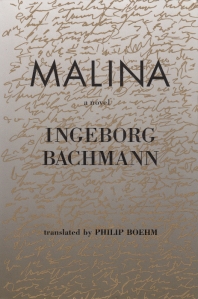 I first read Ingeborg Bachmann for GLMIII with her short-story collection, Three Paths to the Lake, which contained a good mix of stories and was an interesting read. Since then I had been meaning to read some more, especially her only novel, Malina. Malina was published in 1971, two years before her death, and is a modernistic, experimental novel which is often compared to the novels of Virgina Woolf and Samuel Beckett et. al. The techniques adopted with this novel consists of stream-of-consciousness, letters, dialogue, fables and music; and although these techniques were not in themselves overwhelming, I have to say that I didn’t really like this book and it has been a hard slog to get to the end. Please be aware that I will reveal details from the novel that you may wish to remain ignorant of if you are intending to read the book yourself.
I first read Ingeborg Bachmann for GLMIII with her short-story collection, Three Paths to the Lake, which contained a good mix of stories and was an interesting read. Since then I had been meaning to read some more, especially her only novel, Malina. Malina was published in 1971, two years before her death, and is a modernistic, experimental novel which is often compared to the novels of Virgina Woolf and Samuel Beckett et. al. The techniques adopted with this novel consists of stream-of-consciousness, letters, dialogue, fables and music; and although these techniques were not in themselves overwhelming, I have to say that I didn’t really like this book and it has been a hard slog to get to the end. Please be aware that I will reveal details from the novel that you may wish to remain ignorant of if you are intending to read the book yourself.
The book had really appealed to me; from short descriptions and others’ reviews on GoodReads etc. it looked like it would be a great, if intense, read. Just take a look at the blurb on the back of the book:
Malina is a work of sharp, unforgettable images and an irresistible narrative. Here is the story of lives painfully intertwined: the unnamed narrator, haunted by nightmarish memories of her father, lives with the androgynous Malina, an initially remote and dispassionate man who ultimately becomes an ominous influence. Plunging toward its riveting finale, Malina brutally lays bare the struggle for love and the limits of discourse between men and women.
So, ok, it’s the job of the blurb-writer to make the book sound interesting but I find it amusing reading this having read the book as I barely recognise the book from the blurb. So, it is true that the story is told from the point of view of the female, unnamed writer, and this is often fragmentary and opaque. We are drip-fed bits of information but at such a slow rate that it soon becomes extremely frustrating to read. The narrator shares an apartment in Vienna with the somewhat nebulous Malina and appears to have a relationship with the Hungarian man, Ivan. It transpires that Malina and the narrator have known each other since they were young but it is unclear whether they are lovers, brother and sister or just roommates. Malina is a steadying force on the narrator as he offers advice and generally helps out around the flat. In the second part of the novel, in which the narrator describes her harrowing experiences of her father via her nightmares, Malina acts as a confidant, watching over her as she sleeps and he is there as a friend when she wakes. The relationship between Malina and the narrator is alluded to in the text quite early on:
There are people who think that Malina and I are married. We never considered that we might be married, that such a possibility could exist, nor even the idea that other people might think that we were married. For the longest time it never crossed our minds that, like other people, we appear as man and wife wherever we go. This was a complete surprise for us, but we had no idea what to make of it. We laughed a lot.
This is helpful but it still doesn’t clarify their relationship. By the third part of the novel Malina takes on a more active role and by the end of the novel it seems that he is in fact a manifestation of a part of the narrator; as the narrator descends into madness and disappears into a crack in the wall it is only Malina that’s left in the flat. Early on in the novel the narrator had cryptically stated the following:
Ivan and I: the world converging.
Malina and I, since we are one: the world diverging.
The narrator has a relationship with Ivan, who is divorced and has two children, Béla and András, they meet at the flat for coffee and cigarettes and they are constantly on the phone to each other when separated. As the novel progresses it becomes apparent that, although Ivan visits the narrator’s flat, he never has any interactions with Malina and this is made clear at the end of the novel when Malina answers the phone to Ivan who is unaware of Malina’s existence. Where Malina is a shadowy character, Ivan is tangible if a little dull. The telephone conversations between the narrator and Ivan are often inconsequential such as this one.
How was it? Very interesting.
Oh right, so-so, and you
Nothing much, it was interesting
You be sure and go to bed early
You’re the one who’s yawning, you should go to sleep
I’m not going to, I don’t know yet
No, but tomorrow I have to
Do you really have to tomorrow?
Ivan mildly reprimands the narrator for dwelling on the darker aspects of life and at times Ivan’s positive mood affects the narrator, such as when driving through Vienna or when they go on outings with Ivan’s children. But by the end it is the narrator’s negative moods that affects Ivan’s rather than the other way round. In the third part of the book Ivan and the narrator have the following incredibly vague conversation whilst lying on the bed.
Ivan begins: I have to talk to you. Do you remember? I once said there are some things I won’t tell you. But if I…what would you, if I?
If you? I ask. It can hardly be heard.
And if you? I repeat.
Ivan says: I think I have to tell it to you now.
I don’t ask: What do you have to tell me? Because otherwise he might go on talking. But even if I stay silent a little longer he might ask: What would you…
And nothing is asked; nothing is resolved. Which is what makes this novel very frustrating at times, but it is probably what happens in reality more often than not. By the end of the novel it is Malina who appears to be more tangible and Ivan who is a more shadowy character. It is with Malina that the narrator can have meaningful conversations but it is with Ivan that she can have fun.
As previously mentioned I found this incredibly frustrating to read, especially the first part which consisted of 116 pages and contains a lot of pointless telephone conversations with Ivan, letters written to a Herr Schöntal and a fairy tale called The Mysteries of the Princess of Kagran. Part Two was a lot more impressive as it consists of the narrator’s memories of her brutal, sadistic father. Her recollections of her father become increasingly surreal as her father becomes almost like a demonic being and he even subsumes other men’s personalities as well as the narrator’s mother’s physical appearance. I felt that this second part would have been a great short-story. The third part of the book follows on from the first but was generally better, especially the last few pages. But again I felt that the first and third parts would have worked better as a single short-story, especially if the first part had been heavily edited. But reading over these sections now whilst writing this review I am wondering if it is a book that would benefit greatly from a second-read. I think part of the problem was that it was quite different from the book that I was expecting it to be, and though I don’t think it will ever be one of my favourites I think it is probably better than I feel it is at this moment in time. In the Afterword Mark Anderson says that the book was originally criticised for being ‘overly fragmented’ or ‘subjective’ but has since become more appreciated. He also suggests that there is a lot more going on in the novel than I have mentioned, for example he says that it is ‘composed like a musical score’, that the characters reflect the structure of postwar Vienna, that sections allude to the Holocaust or Dante’s Hell etc. but such interpretations are beyond me. Have you read Malina?



